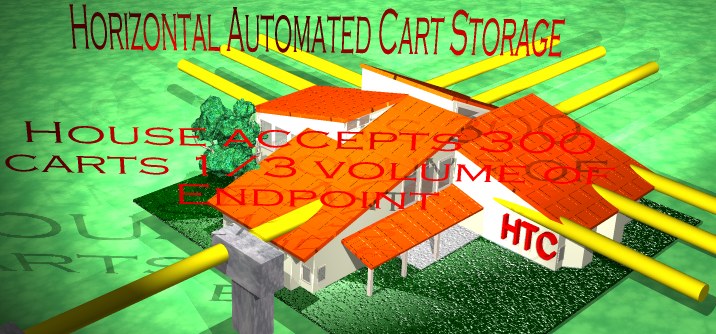 Congestion prevention requires that the
endpoint be able to rapidly accommodate arriving carts. We believe that
this can be handled by training users to rapidly free the arrival area and
remove the cart. Some in the transportation field believe this is unproved.
So, for another $ 300,000 per endpoint, one can dispense with the cart removal
requirement completely by putting another switch inside the house, now the
arriving cart volume can be divided into nine storage tubes, with the rail
continuing. Each of the tubes sticking out of the house is 76 meters long,
9 tubes can hold all 300 carts at 2.3 meters per cart length. Three such
houses are needed for an automated endpoint of a commuting line of 1000 carts,
a switch "fills" them with 30 carts at a time, every few seconds.
Congestion prevention requires that the
endpoint be able to rapidly accommodate arriving carts. We believe that
this can be handled by training users to rapidly free the arrival area and
remove the cart. Some in the transportation field believe this is unproved.
So, for another $ 300,000 per endpoint, one can dispense with the cart removal
requirement completely by putting another switch inside the house, now the
arriving cart volume can be divided into nine storage tubes, with the rail
continuing. Each of the tubes sticking out of the house is 76 meters long,
9 tubes can hold all 300 carts at 2.3 meters per cart length. Three such
houses are needed for an automated endpoint of a commuting line of 1000 carts,
a switch "fills" them with 30 carts at a time, every few seconds.The switch inside the house feeds the cart volume into the different tubes. Note that in the image, the tubes should be placed more diagonally rather than at right angles, so as to avoid sharp kinks. So in this case, we are unburdening the user, but need to search harder for properties having space for the tubes. In addition, also not shown, the storage tubes are twice the diameter to permit upright walking once the rider gets out of the cart, which is after passing the switch. The should really be no doubt in the mind of anyone with at least minimal training in mechanical engineering that this is a viable option, and we are still at a fraction of the cost of light rail, and much more efficient than "circulating" PRT systems in which cart arrival has to be awaited. Once the carts have arrived here they stay until the next morning commute.
